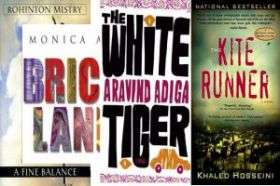Take novels seriously, urge poverty experts

(PhysOrg.com) -- Best sellers can give powerful insights into aspects of poverty that are overlooked by scholars, government advisors and pundits, according to a report.
The team of poverty researchers from The University of Manchester and the London School of Economics say novels should be taken as seriously as academic literature as an important source of knowledge on international development.
“Despite the regular flow of academic studies, expert reports, and policy position papers, it is arguably novelists who do as good a job – if not a better one – of representing and communicating the realities of international development.
“Best sellers such as Aravind Adiga’s Man Booker Prize-winning The White Tiger’ and Rohinton Mistry’s ‘A fine balance’ convey complex ideas in a most powerful way,” said Dr Dennis Rodgers from The University of Manchester’s Brooks world Poverty Institute (BWPI).
“While fiction may not always show a set of presentable research findings, it does not compromise on complexity, politics or readability in the way that academic literature sometimes does.
“And fiction often reaches a much larger and diverse audience than academic work and may therefore be more influential in shaping public knowledge and understanding of development issues.”
Dr David Lewis from the London School of Economics said: “Storytelling is one of humanity’s oldest methods of possessing information and representing reality.
“The stories, poems and plays we categorize as literary fiction were once accepted in much the same way that scientific discourse is received as authoritative today.”
“We’re not arguing that poets should replace finance ministers,” said BWPI Research Director Professor Michael Woolcock.
“But we are stressing that novelists make distinctive and important contributions to the broader storehouse of knowledge on the processes, experience and consequences of ‘development’”
He added: “Fiction is important because it often concerned with the basic subject matter of development:
“This includes things like the promises and perils of encounters between different peoples; the tragic mix of courage, desperation, humour, and deprivation characterizing the lives of the down-trodden.”
Best sellers examined by the team:
“The White Tiger” by Aravind Adiga
The 33-year-old Indian-born writer won this year's Man Booker Prize with his debut novel the White Tiger. What the report said:
“The novel is a superbly crafted and passionate depiction of the perils and pitfalls of rampant capitalism in contemporary India, deftly highlighting the social injustice and moral corruption that underpin the country’s apparently miraculous economic development during the past decade.”
A Fine Balance by Rohinton Mistry
The Man Booker shortlisted ‘A Fine Balance’ is the third book by Rohinton Mistry. It is set in Mumbai, India between 1975 and 1977 during the turmoil of The Emergency, a period of expanded government power and crackdowns on civil liberties. What the report said:
“A Fine Balance clearly has an edge over academic or policy texts, as demonstrated by the fact that it has as become a fixture on university reading lists for courses on subjects such as rural-urban migration, urbanization, and “livelihoods. It connected with a huge readership, selling over half a million copies in the US alone by 2002, a much wider circulation than any academic or policy work on the same subject.”
Kite Runner by Khaled Hosseini
The Kite Runner tells the story of Amir, a boy from of Kabul, who is haunted by the guilt of betraying his childhood friend Hassan. The story is set against a backdrop of the fall of the monarchy in Afghanistan the Soviet invasion, the mass exodus of refugees, and the rise of the Taliban. What the report said:
“The Kite Runner, has arguably done more to educate Western readers about the realities of daily life in Afghanistan under the Taliban and thereafter than any government media campaign, advocacy organization report, or social science research.”
Raag Darbari by Shrilal Shukla
Raag Darbari is one of the most famous Hindi novels ever written. The author Shrilal Shukla is known for his social and political satire. What the report said::
“Raag Darbari suggests that migration is the only hope for the rural poor radically challenged prevalent romantic stereotypes of the Indian countryside being idyllic, harmonious, and timeless in a way that many academic and policy texts on rural India pointedly failed to do during the 1950s and 1960s.”
Brick lane by Monica Ali
Brick Lane follows the life of Nazneen, a Bangladeshi woman who moves to Tower Hamlets in London at the age of 18 — her English consisting of "sorry" and "thank you" — to marry an older man. What the report said:
“As the first book to enter in the UK mainstream to feature the broad subject of Bangladesh and Bangladeshi people it is arguable that Brick Lane has contributed to wider public understandings of global development issues in ways that no academic writing ever has.”
Provided by University of Manchester





















